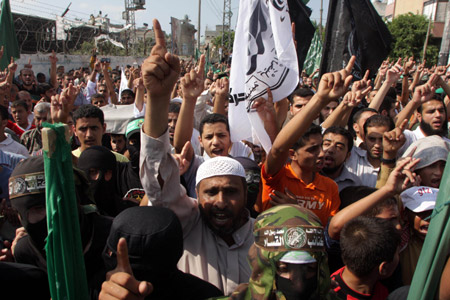Protests against Israel flare in Palestine
Supporters of Palestinian President Mahmoud Abbas' Fatah party in the West Bank and Islamic Hamas movement in the Gaza Strip held on Friday separate demonstrations to protest the recent Israeli measures against al-Aqsa Mosque in the Old City of Jerusalem.
 |
|
Supporters of Islamic Hamas movement shout slogans in a demonstration in central Gaza Strip on Oct. 9, 2009 to protest the recent Israeli measures against al- Aqsa Mosque in the Old City of Jerusalem. [Khaled Omar/Xinhua] |
The protests and rallies were organized in both areas as U.S. Middle East envoy George Mitchell has been holding talks with Israeli and Palestinian National Authority (PNA) leaders trying to bridge gaps between them and help the two sides to resume the stalled peace negotiations on the final status issues.
Right at the end of Friday's prayers, according to witnesses, violent clashes erupted between dozens of Palestinians and Israeli soldiers and police in east Jerusalem's neighborhoods and at Qalandia Israeli army checkpoint that separates Jerusalem, from the West Bank city of Ramallah.
The clashes inside and outside Jerusalem on Friday coincided with earlier Israeli security measures were carried out to prevent thousands of West Bank Palestinians from reaching Jerusalem. Israel carried out the security measures to prevent Palestinian massive protest.
The witnesses said that Israeli army soldiers and police used force to disperse the demonstrators by firing tear gas canisters and rubber bullets, adding that dozens of Palestinians suffered suffocation and at least six people were injured. The protests were against banning prayers from reaching al-Aqsa Mosque.
In the Hamas-ruled Gaza Strip, thousands of Palestinians, supporters of Hamas and the less influential Islamic Jihad, took to the streets in several areas and demonstrated against what they called "the Zionist attacks on al-Aqsa Mosque and preventing prayers from reaching it."
 |
|
Palestinians, Israelis and foreign demonstrators display the tear gas cases that were fired by Israeli troops during a demonstration against Israel's separation barrier in the West Bank village of Bilin, near Ramallah, on Oct. 9, 2009. [Nidal Eshtayeh/Xinhua] |
Deposed Prime Minister of Hamas rule in the Gaza Strip Ismail Haneya told reporters after Friday prayers that "the real battle to protect al-Aqsa Mosque has started." He added that "Arab and Moslem nations must carry their responsibilities to protect al-Aqsa from the Israeli barbarian attacks."
"What happens in Jerusalem is an implementation of a Zionist plan to fully seize al-Aqsa Mosque," said Haneya, adding that "It is more dangerous than what the Palestinians had gone through over the past few decades. We won't give any concession over our mosque and will pay a high price to protect it."
Asked about a report on offering Obama the Nobel Peace Prize on December, Haneya told reporters "I hope that this prize would help to change the American policy towards the Palestinians and towards the occupation, adding "We want Obama's words to turn into practical deeds on the ground."
The Israeli-Palestinian talks had been installed for more than a year, where both Israel insists to keep construction into settlements in the West Bank and east Jerusalem, while the Palestinians insist that talks would never be resumed until Israel stops settlement and recognize the U.S. backed two-state solution.
The Palestinians say that there are six major final status issues, Jerusalem, settlement, the refugees, water, security and borders should be negotiated and resolved with Israel, in order to reach a permanent peace agreement leads to the establishment of an independent Palestinians with east Jerusalem as its capital.
Israel says undivided Jerusalem is the eternal capital of the Jewish state. It would not stop settlement activities, rejects the return to 1967 borders, conditions the recognition of a Palestinian state with recognition of Israel as a Jewish state and rejects the return of Palestinian refugees to its borders.
 |
|
Supporters of Islamic Hamas movement march in a demonstration in central Gaza Strip on Oct. 9, 2009 to protest the recent Israeli measures against al-Aqsa Mosque in the Old City of Jerusalem. [Khaled Omar/Xinhua] |
Mitchell, who arrived in Israel on Wednesday evening, held talks on Thursday with Israeli defense minister Ehud Barak and held talks Friday with hawkish Israeli Prime Minister Benjamin Netanyahu. Mitchell is scheduled to hold talks with president Abbas in Ramallah later on Friday.
Palestinian negotiator Saeb Erekat said in a press statement sent to reporters that President Abbas would reiterate to Mitchell that "What is between us and Israel is a list of commitments that Israel must abide by, mainly settlement activities, including the natural growth and what happens in Jerusalem."
Mitchell, who pays a second official visit in Israel and the Palestinian territories since he was nominated by President Obama, has so far failed to convince Israel to freeze settlement. He is trying to find a way out to resume the peace negotiations by agreeing on a compromise between the two sides.
Meanwhile, thousands of Fatah party supporters demonstrated in several West Bank cities in sympathy with Jerusalem and in a protest to the Israeli security measures against prayers at al-Aqda Mosque. A general strike dominated all West Bank cities upon Fatah party's request.
"The Israeli measures in Jerusalem are just to escape from the political commitments of the peace process and also to escape from all the peace agreements that were signed with the Israeli entity," Mohamed al-Madani, a member of Fatah movement central committee told demonstrators in Ramallah.
 0
0 







Comments